Rice programme banking on multiple small farms - Tufton sets 25% production target
Published: Friday | July 10, 2009

Jamaica Broilers Group led a tour of the 25-hectare Amity Experimental Rice Farm project on which it is collaborating with the Ministry of Agriculture. Seen here in the rice fields in St Catherine, Monday, July 6, from left, are president and chief executive officer of Jamaica Broilers, Christopher Levy; Aubyn Hill, board director of Jamaica Broilers; rice project manager Richard Sadler holding up the rice plant, Agriculture Minister Dr Christopher Tufton, who is assessing the feel of the grain, and opposition spokes-man on agriculture Roger Clarke. - Ricardo Makyn/Staff Photographer
Agriculture minister Christopher Tufton is eager to expand rice cultivation beyond the 25-acre experiment with the Prosequisa four variety, now being reaped by Jamaica Broilers Group (JBG) at its Amity Hall, St Catherine farm.
But Broilers, a billion poultry producer at its core, which poured $5 million of its own money into the venture is cool to the idea of deepening its involvement in rice growing.
"Basically we have started to harvest, so we will have to go through the whole project," JBG chief executive officer Christopher Levy.
"We will go into ratoon sometime in September; at that time we will evaluate it, because then we would have a full picture of the project."
Tufton meantime is striking mini-deals with farmers to move the rice programme along.
Instead of launching off with the big 6,000 hectare plan that government was prepared to seed for $300 million, the project will start with one-thirtieth the land space.
Another 200 hectares
"Over the next year, it is our intention to put another 200 hectares of rice into production," said Tufton.
"We have already recruited some 70 farmers from the traditional rice-growing areas and we are starting to do an assessment of rice-growing areas and we intend to carry on to the next phase, where we provide them with the materials and best practices."
But neither the farmers nor government seem willing to commit to the capitalisation of the rice operations. The farmers will convert some of their own land - 10-acre plots - and the ministry will offer them seedlings.
Reaping equipment
The Broilers Amity farm is using drying and reaping equipment in the cultivation; but Tufton's corps of farmers are not similarly equipped.
Broilers Group chief executive Christopher Levy said, however, that while there is no formal arrangement regarding machinery, his company would be willing to make the equipment available to those who ask.
Reaping is ongoing at the Broilers farm, producing 10 tonnes to date - half of which was processed and packaged by Kingston-based Jamaica Rice Milling Company Limited, a subsidiary of Jamaica Flour Mills.
Tufton says Jamaica hopes to at least match Guyana's rice yield of six tonnes per hectare.
And he hopes to rebalance supplies so that Jamaica is less reliant on imports.
The country consumes 100,000 tonnes of the grain, all imported.
Regional coordinator for the Caribbean Rice Association, Azim Hosein, points to the importance of quality seeds to successful rice cultivation and said the next step must be the setting up of a seed project.
Hosein also recommended the establishment of a local rice growers' association for Jamaica.
Planting on the Amity experimental farm began in January, but as the state contemplates the expansion of the rice producing project, there still needs to be scientific determination of the best rice varieties for Jamaica.
Nine varieties
Nine varieties of rice from Guyana, the United States and the Dominican Republic are now being grown at the government plant research station at Bodles, St Catherine to determine the most suitable.
Richard Sadler, project manager for the rice programme, speaking at a workshop with prospective rice farmers from Westmoreland and St Elizabeth, said the rice variety chosen should be high-yielding with ratoons similar to sugar cane, and capable of being harvested up to four times before any replanting is done.
Project aim
At the start of the pilot project, Tufton said the aim was to produce enough to satisfy local consumption and as substitution for corn in the production of animal feed, but he now says the state will be seeking to supply 10 per cent of demand and later up to 25 per cent of the 100,000 tonnes of rice that Jamaica imports annually.
Tufton hopes to hit the 25 per cent mark in three years.
If the experiment is successful, the country's main staple may be cultivated in areas such as Elim, St Elizabeth; and George's Plain and Meylersfield in Westmoreland.
"What is needed at this time is for a proper structure to be put in place, as rice can be a viable venture," he said, "but what we need to do is take a serious look into whether or not we want to go this route and put policies in place to support it."
mark.titus@gleanerjm.com

Jamaican premium rice from the Amity Hall rice project. - Ricardo Makyn/Staff photograpger
Amity experimental rice





















